See also
| | This article related to an official document of the Catholic Church is a stub. You can help Wikipedia by expanding it. |
Parens scientiarum (Latin: The Mother of Sciences) is the incipit designating a papal bull issued by Pope Gregory IX on April 13, 1231, after the University of Paris strike of 1229. The bull assured the independence and self-governance of the University of Paris, where the pope had studied theology. [1]
| | This article related to an official document of the Catholic Church is a stub. You can help Wikipedia by expanding it. |
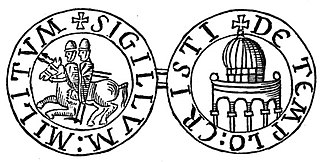
The Poor Fellow-Soldiers of Christ and of the Temple of Solomon, also known as the Order of Solomon's Temple, the Knights Templar or simply the Templars, were a Catholic military order founded in 1119, headquartered on the Temple Mount in Jerusalem through 1128 when they went to meet with Pope Honorius II. They were recognized in 1139 by the papal bull Omne datum optimum. The order was active until 1312 when it was perpetually suppressed by Pope Clement V by the bull Vox in excelso.

Pope Alexander IV was head of the Catholic Church and ruler of the Papal States from 12 December 1254 to his death in 1261.
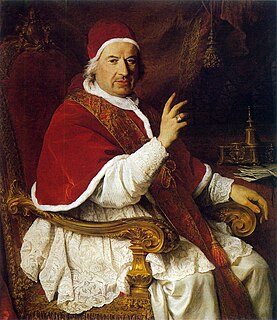
Pope Benedict XIV, born Prospero Lorenzo Lambertini, was head of the Catholic Church from 17 August 1740 to his death in 1758.
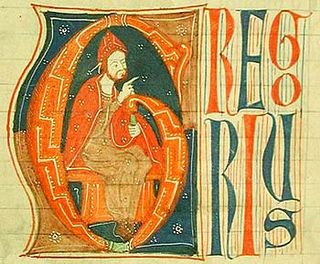
Pope Gregory IX was Bishop of Rome, and as such, head of the Catholic Church and ruler of the Papal States from 19 March 1227 to his death. He is known for issuing the Decretales and instituting the Papal Inquisition, in response to the failures of the episcopal inquisitions established during the time of Pope Lucius III, through his papal bull Ad abolendam issued in 1184.
Pope John XXII, born Jacques Duèze, was head of the Catholic Church from 7 August 1316 to his death in 1334.
Year 1349 (MCCCXLIX) was a common year starting on Thursday of the Julian calendar.
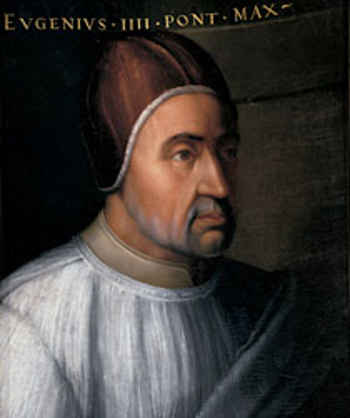
Pope Eugene IV, born Gabriele Condulmer, was head of the Catholic Church and ruler of the Papal States from 3 March 1431 to his death. Condulmer was a Venetian, and a nephew of Pope Gregory XII. In 1431, he was elected pope. His tenure was marked by conflict first with the Colonnas, relatives of his predecessor Martin V, and later with the Conciliar movement. In 1434, due to a complaint by Fernando Calvetos, bishop of the Canary Islands, Eugene IV issued the bull "Creator Omnium", rescinding any recognition of Portugal's right to conquer those islands, still pagan. He excommunicated anyone who enslaved newly converted Christians, the penalty to stand until the captives were restored to their liberty and possessions. In 1443 Eugene decided to take a neutral position on territorial disputes between Portugal and Castile regarding rights claimed along the coast of Africa.

The Sixth Crusade, commonly known as the Crusade of Frederick II (1228–1229), was a military expedition to recapture the city of Jerusalem. It began seven years after the failure of the Fifth Crusade and involved very little actual fighting. The diplomatic maneuvering of the Holy Roman Emperor and King of Sicily, Frederick II, resulted in the Kingdom of Jerusalem regaining some control over Jerusalem for much of the ensuing fifteen years as well as over other areas of the Holy Land.

The University of Paris, metonymically known as the Sorbonne, was the main university in Paris, France, active from 1150 to 1970, with the exception of 1793–1806 under the French Revolution. In 2019, University of Paris V and University of Paris VII merged to form a new University of Paris, leaving the number of successor universities at 11. In 2017, University of Paris IV and University of Paris VI merged to form Sorbonne University.

A medieval university was a corporation organized during the Middle Ages for the purposes of higher education. The first Western European institutions generally considered universities were established in the Kingdom of Italy, the Kingdom of England, the Kingdom of France, the Kingdom of Spain, and the Kingdom of Portugal between the 11th and 15th centuries for the study of the Arts and the higher disciplines of Theology, Law, and Medicine. During the 14th century there was an increase in growth of universities and colleges around Europe. These universities evolved from much older Christian cathedral schools and monastic schools, and it is difficult to define the exact date when they became true universities, though the lists of studia generalia for higher education in Europe held by the Vatican are a useful guide.

Robert Kilwardby was an Archbishop of Canterbury in England and a cardinal. Kilwardby was the first member of a mendicant order to attain a high ecclesiastical office in the English Church.

Konrad I of Masovia, from the Polish Piast dynasty, was the sixth Duke of Masovia and Kujawy from 1194 until his death as well as High Duke of Poland from 1229 to 1232 and again from 1241 to 1243.
The University of Paris strike of 1229 was caused by the deaths of a number of students in punishing a student riot. The students protested with a "dispersion", or student strike, which lasted more than two years and led to a number of reforms of the medieval university. The event demonstrates the town and gown power struggles with the Church, secular leaders and the emerging student class and a lessening of local Church authority over the University of Paris. The university was placed squarely under direct papal patronage, part of the program to centralise the Church structure, which had intensified under Innocent III.

Jacques de Vitry was a French canon regular who was a noted theologian and chronicler of his era. He was elected bishop of Acre in 1214 and made cardinal in 1229. His Historia Orientalis is an important source for the historiography of the Crusades.
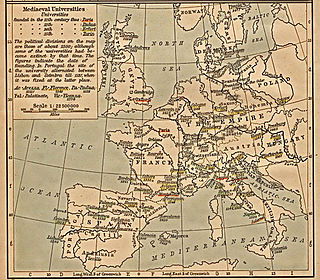
Studium generale is the old customary name for a medieval university in medieval Europe.

Town and gown are two distinct communities of a university town; 'town' being the non-academic population and 'gown' metonymically being the university community, especially in ancient seats of learning such as Oxford, Cambridge, Durham, and St Andrews, although the term is also used to describe modern university towns as well as towns with a significant public school. The metaphor is historical in its connotation but continues to be used in the literature on urban higher education and in common parlance.

Peter of Hispania was the author of the Tractatus, later known as the Summulae Logicales, an important medieval university textbook on Aristotelian logic. As the Latin Hispania was considered to include the entire Iberian peninsula, he is traditionally and usually identified with the Portuguese scholar and ecclesiastic Peter Juliani, who was elected Pope John XXI in 1276. The identification is sometimes disputed, usually by Spanish authors, who claim the author of the Tractatus was a Castilian Blackfriar. He is also sometimes identified as Petrus Ferrandi Hispanus.
The Catholic University of the West, known colloquially to its students as «la Catho», is a university located in Angers, France.
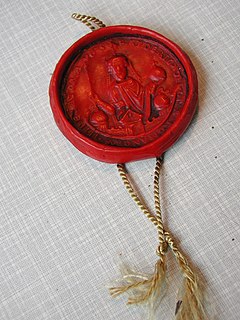
Authentica habita, or Privilegium Scholasticum, was a document written in 1155 ca. by the Emperor Frederick I Barbarossa. In it, he set out for the first time some of the rules, rights and privileges of universities. It is a key founding document in the history of the medieval university in Europe.

Clerici vagantes or vagabundi is a medieval Latin term meaning "wandering clergy" applied in early canon law to those clergy who led a wandering life either because they had no benefice or because they had deserted the church to which they had been attached.